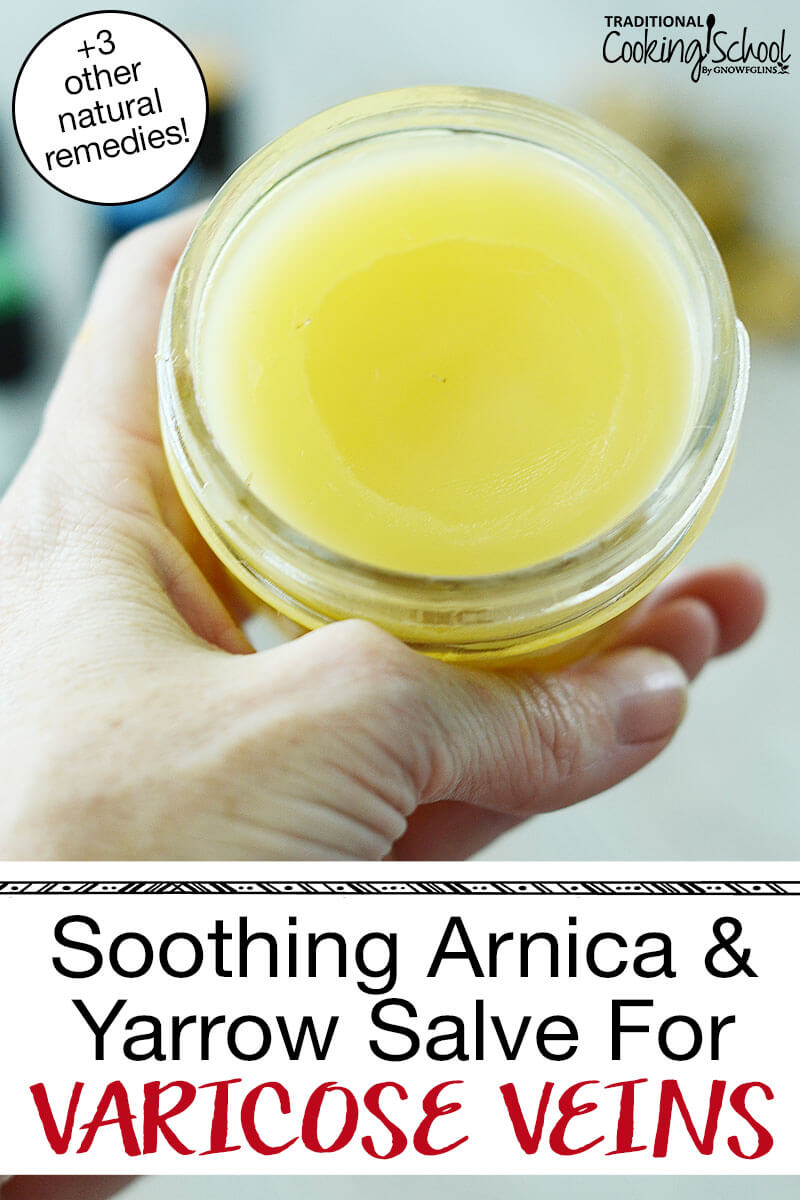 Have you ever wondered if there are any natural treatments for varicose veins?
Have you ever wondered if there are any natural treatments for varicose veins?
Is it possible to get rid of those lumpy, bumpy bluish veins that often appear on our legs as we age?
You are not alone. A lot of us have these questions and for good reason; varicose veins can bring up a whole host of issues.
First of all, varicose veins often cause us to feel self-conscious about our appearance. Even if we don’t consider ourselves to care much about our looks, it’s something that bothers many of us.
Secondly, varicose veins can be uncomfortable.
Finally, varicose veins can eventually lead to other health problems.
In today’s post, we address the possible health issues with varicose veins and look at the best non-surgical and natural treatments.
Table Of Contents
What Are Varicose Veins?
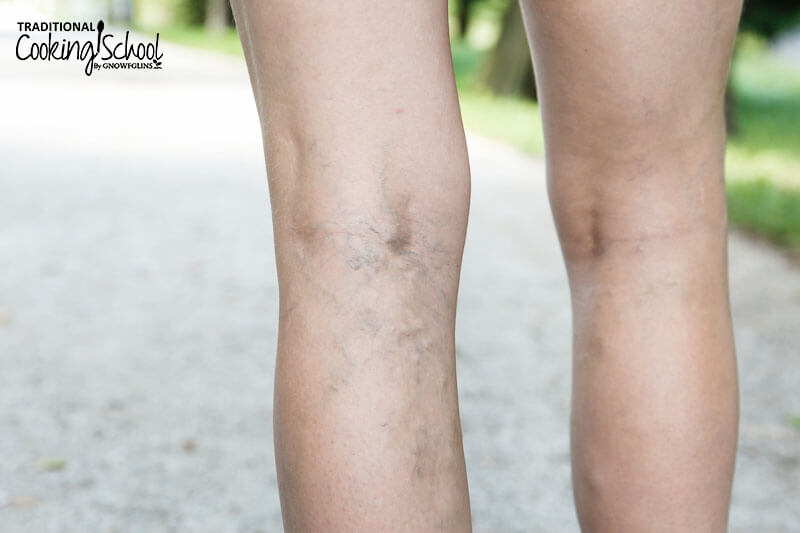
Varicose veins are veins that have become damaged and distorted. They often appear blue or dark purple in color and seem to bulge from the skin.
Varicose veins occur when valves inside the blood vessels weaken. When these valves weaken, they are no longer able to push the blood up toward the heart effectively (which is their primary role). As a result, some of the blood flows back downward and pools in the veins.
This is why it is recommended that people with varicose veins elevate their legs in order to encourage the blood to flow in the right direction.
What About Chronic Venous Insufficiency?
You may also hear the term Chronic Venous Insufficiency (CVI) in reference to varicose veins.
According to the Cleveland Clinic, Chronic Venous Insufficiency is…
“a condition that occurs when the venous wall and/or valves in the leg veins are not working effectively, making it difficult for blood to return to the heart from the legs. CVI causes blood to ‘pool’ or collect in these veins, and this pooling is called stasis.”
While varicose veins and Chronic Venous Insufficiency are very similar, and both considered chronic venous disorders, CVI is considered more severe (source).
That being said, most of the suggestions here should be helpful for both conditions.
Do Varicose Veins Have Any Associated Health Issues?
It’s natural to feel concern when varicose veins appear. Bulging, twisted blood vessels on your legs definitely seem worrisome.
In many cases, varicose veins bring minimal discomfort and very little risk (apart from their appearance, which most of us do not enjoy on our bodies). However, any condition in which blood flow is impeded can be problematic. Blood circulation is important.
Complications associated with varicose veins include:
- Venous stasis ulcers — ulcers that develop when a vein doesn’t properly drain fluid
- Phlebitis — inflammation of the vein that can cause pain, tenderness, and redness
- Blood clots — slow blood flow through varicose veins can cause blood to clot. Superficial clots are not always worrisome, but if clots form in the deeper, larger veins (known as Deep Vein Thrombosis) there is great cause for concern. Clots in deeper veins can travel to other parts of the body. If you suspect deep vein thrombosis, seek medical attention immediately.
What Is The Treatment For Varicose Veins?
Varicose veins treatment ranges from lifestyle changes to surgery. Lifestyle changes may help reduce or prevent varicose veins, whereas surgery is often used to remove varicose veins altogether.
Most doctors recommend those with varicose veins make the following lifestyle changes:
- Avoid tight clothing especially around the waist or groin area, as it restricts blood flow.
- Keep a healthy weight since excess weight can cause extra pressure on blood vessels.
- Elevate legs to improve circulation. Legs should be raised above the heart. For example, lay down and place legs on a stack of pillows.
- Avoid sitting or standing in the same position for long periods of time (changing positions encourages blood flow).
- Avoid standing for long periods of time, especially on concrete.
- Wear low heels instead of high ones.
- Wear compression stockings (not socks). Stockings should be thigh high.
- Exercise to increase circulation.
Medical procedures for varicose veins include:
Many people resort to surgery for varicose vein treatment. Although much more invasive than home treatments, these are often outpatient surgeries.
Surgery
Surgeons remove damaged veins via endoscopic vein surgery. Usually reserved for severe cases. (Source.)
Sclerotherapy
In sclerotherapy procedure, the doctor injects the veins with a solution that causes veins to scar and close. Essentially, killing the vein. Most typically used for small and medium-sized varicose veins as well as spider veins. (Source.)
Foam Sclerotherapy
The same procedure as mentioned above, but foam is used instead of a solution. Reserved for larger veins. (Source.)
Laser Treatments
Lasers send intense bursts of light to the vein. This damages the vein and causes scar tissue to form. The vein eventually dies, thus blood stops running through it which means it cannot continue to pool. Therefore, the vein will eventually disappear. (Source.)
High Ligation And Vein Stripping
This is another procedure in which veins are removed, however, the surgery will first tie off the vein before it joins a deep vein and then remove the vein through a small incision (source).
Are Surgical Procedures For Varicose Veins Worthwhile?
Surgical procedures are often expensive and invasive. They come with risks as well as possible side effects.
While necessary in some cases, many wish to avoid these if at all possible.
If home remedies and lifestyle changes do not work to reduce varicose veins, surgery may be necessary when frequent discomfort occurs.
Are Varicose Veins Curable Without Surgery?
You may be wondering, is there any treatment for varicose veins? Are they curable?
And if so, are there non-surgical, natural treatment options?
The answer to these questions is: it depends.
There are some natural remedies for varicose veins, but whether they work for you depends on the severity of varicose veins, as well as the nature of your own body. Treatments work differently for everyone.
That said, most natural treatments for varicose veins are simple and non-invasive, so it doesn’t hurt to try them.
Natural Treatments For Varicose Veins
Besides the lifestyle changes mentioned above, the following natural remedies may help you find relief from varicose veins, and minimize their appearance.
#1 — Vitamin C
“Vitamin C and bioflavonoids are essential for healthy capillaries and veins.” —Herbal Recipes for Vibrant Health by Rosemary Gladstar
Vitamin C supplements are easy to find, but you can also eat foods rich in vitamin C such as blueberries, bilberries, rose hips (add to tea), broccoli, Brussels sprouts, strawberries, oranges, tomatoes, and fermented vegetables (such as sauerkraut).
#2 — Herbs That Increase Circulation
Since varicose veins are a result of blood pooling from valves that are not circulating blood efficiently, it makes sense to supplement with herbs that support circulation.
Herbs to consider adding to your diet in order to increase circulation include:
- Butcher’s Broom
- Cayenne
- Elderberry
- Ginger
- Gingko
- Hawthorn
#3 — Witch Hazel Compress
The toning and astringent properties of witch hazel make it a good varicose veins treatment. Some believe it can aid in tightening distended veins.
The cooling effect of witch hazel is also helpful in soothing irritation caused by varicose veins.
To make a witch hazel compress, soak a cloth in witch hazel and apply to varicose veins for 20 to 30 minutes.
You can also spray witch hazel directly on the skin with a spray bottle. The compress-method is a more targeted treatment, but witch hazel spray can be soothing as well.
For an extra soothing effect, mix German Chamomile Hydrosol with equal parts Witch Hazel and use as a compress or spray.
#4 — Soothing Salve For Varicose Veins
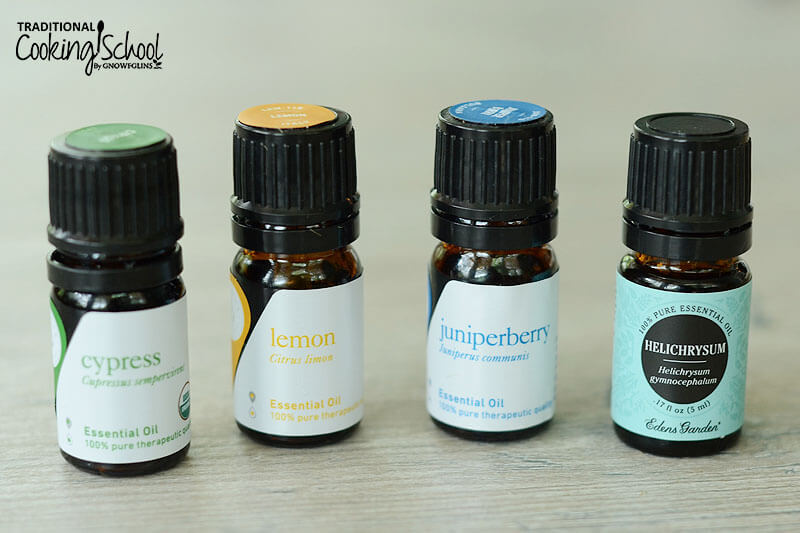
This salve contains herb-infused oil and essential oils chosen to specifically target varicose veins. The main goals of this salve are to reduce inflammation and increase circulation.
Here’s a little bit about the ingredients I’ve chosen to include:
- Arnica — for soothing aches, pains, and bruising that may be associated with varicose veins.
- Yarrow — for anti-inflammatory and astringent properties. May reduce swelling and tighten and tone the veins.
- Helichrysum essential oil — for treating bruises, pain, wounds, and all manner of skin issues.
- Juniper Berry essential oil — for astringent and anti-inflammatory properties.
- Cypress essential oil — to improve circulation and relieve swelling and pain.
- Lemon essential oil — to improve circulation and reduce swelling (plus the scent pairs well with cypress and juniper berry).
Other herbs to consider adding:
- Horse Chestnut — may reduce inflammation and improve tone of veins. Germany’s Commission E approves Horse Chestnut as a treatment for chronic venous insufficiency and varicose veins.
- Witch Hazel Bark — has astringent properties thought to help tone and firm.
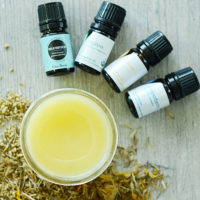
Soothing Arnica & Yarrow Salve For Varicose Veins
Varicose veins are bumpy, lumpy, and... painful. If you have them but aren't sure what to do, this in-depth article explains everything from causes and symptoms to how to get rid of varicose veins, including 4 natural remedies with herbs and essential oils if you're not a fan of surgery. The last remedy, a soothing arnica and yarrow salve, helps bring relief and healing.
Ingredients
- 1/2 cup sunflower oil may substitute other oils, such as olive or avocado
- 2 tablespoons beeswax pastilles
- 1/8 cup arnica flowers
- 1/8 cup yarrow flowers
- 6 drops helichrysum essential oil
- 15 drops juniper berry essential oil
- 15 drops cypress essential oil
- 6 drops lemon essential oil steam distilled to avoid any issues with phototoxicity
Instructions
-
First, infuse oil with herbs.
-
Option 1 (slow method): Place herbs and oil in jar and close tightly with lid. Let sit for 4 weeks. Strain and discard herbs.
-
Option 2 (quick method): Place herbs and oil in the top of a double boiler. Warm over low heat for 2 hours (stay close by in case water needs replenishing in bottom of the double boiler). Strain and discard herbs.
-
Place herb-infused oil and beeswax in the top of a double boiler.
-
Warm over medium-low heat until beeswax is melted. Stir to combine.
-
Remove from heat and allow to cool briefly before adding essential oils.
-
Add essential oils and stir to distribute evenly.
-
Pour into container.
-
Let cool completely before closing with lid.
-
Store in cool place out of direct sunlight. Should keep for 6 months.
-
Apply salve to affected area gently. It is not generally recommended to massage varicose veins firmly.
There are a lot of options when it comes to treating varicose veins. Before opting for surgery or invasive procedures, it is worth trying some of the recommended lifestyle changes and natural remedies to see if they provide some relief.
Many of the treatments mentioned here are not miracle cures in and of themselves, but when used in combination with lifestyle changes may help reduce discomfort and swelling from varicose veins.
Above all, remember, your main goal in treating varicose veins is to reduce inflammation and increase circulation. Coupled together, these two can dramatically impact the look and feel of varicose veins.
Are you looking for natural relief from varicose veins? Will you give this soothing salve a try?
Disclaimer: Herbs are powerful medicine. I’m not a doctor. All information is intended for your general knowledge only and is not a substitute for medical advice or treatment for specific medical conditions. You are responsible for your own health and for the use of any remedies, treatments, or medications you use at home.
...without giving up the foods you love or spending all day in the kitchen!
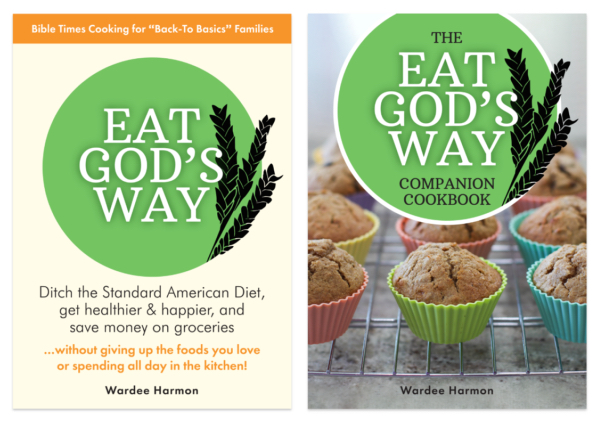
2 free books:
Eat God's Way
Ditch the Standard American Diet, get healthier & happier, and save money on groceries...
We only recommend products and services we wholeheartedly endorse. This post may contain special links through which we earn a small commission if you make a purchase (though your price is the same).


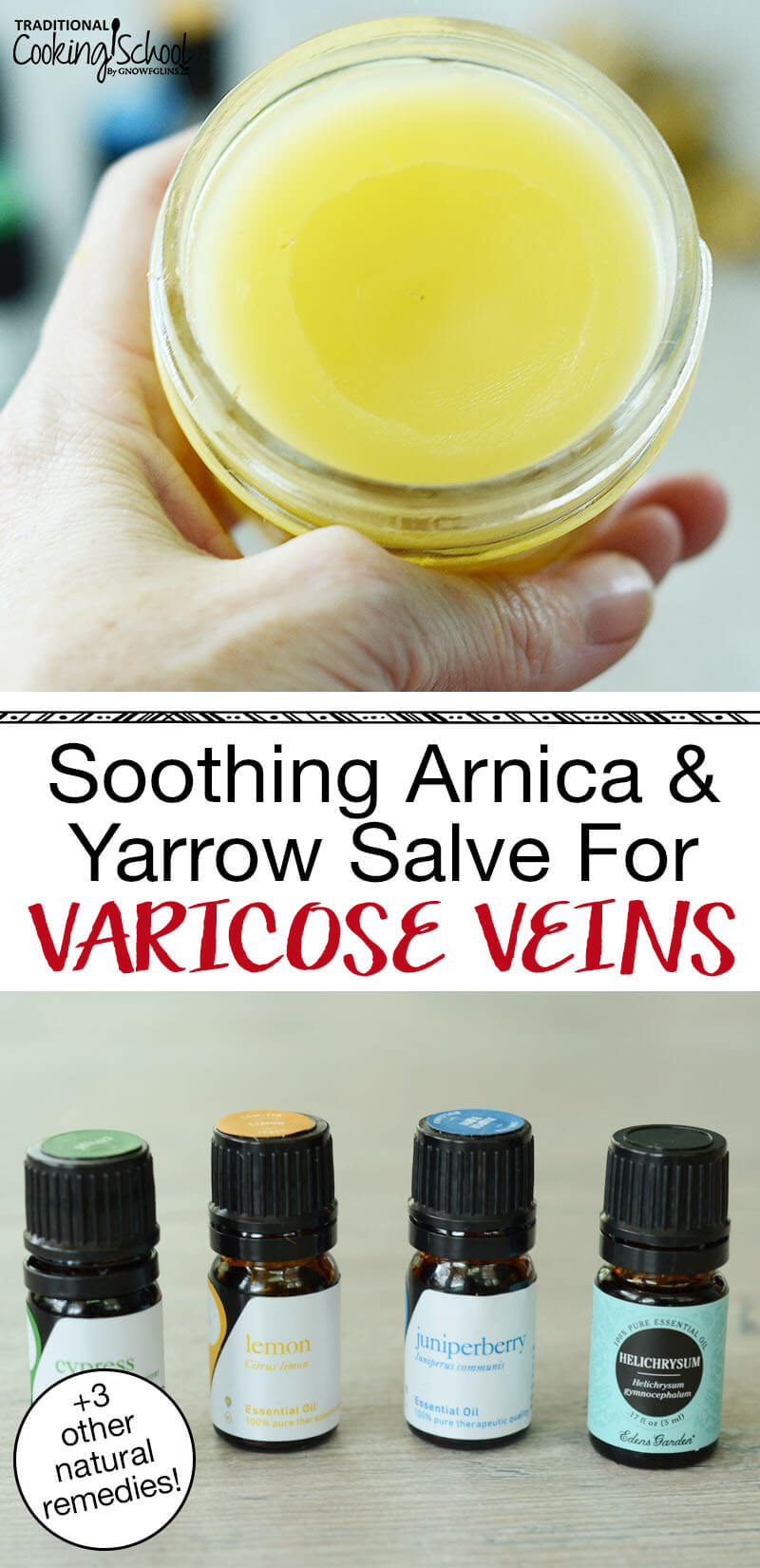
Stacey, thanks for this recipe, I have yarrow pom EO, can I use this in the recipe instead of the flowers?
Thank you for this informative article on such a sensitive but important topic! I was wondering if you think that varicose veins are genetic or just a lack of good nutrition? Thanks again!
genetics & lifestyle
I am shocked it is not more common knowledge that you CAN cure varicose veins and it is simple!
If you are over weight loose it.
Exercise.
Don’t eat anti nutrients.
Reduce your bad fats right down.
Eat plenty of vascular strengthening foods eg beetroot, buckwheat (prepared properly of course) etc.
It sadly is that simple I know because a series of events meant that I used to have them and that’s how I got rid of them! My veins have been put through what would make most peoples collapse and yet mine stayed strong, I am often complimented on my veins by medical professionals, I was put on heart tablets I took myself off them and have no pains at all.
Mankind used to eat what they needed to be healthy and modern drugs are derived from nature, it is about time people woke up to “you are what you eat” Look at people who live in places like the Amazon rain forest etc they know exactly where to go for their medicine and that is exactly how all mankind used to live before we were all being given drugs like they are candy which ironically in a lot of cases only mask the symptoms not cure them and also create new ones either by not addressing the actual problem or by creating new problems through reactions to the medication which then need even more medicine to “solve” the problem! Not good if you are the patient but great if you are selling or producing them!
Sorry for my rant but it is a touchy subject for me. It is incredibly frustrating to live in a country where I pay for medical treatment through my wage (that’s right the NHS is not free its just paid according to wage not usage) and there are people who take no responsibility for their health at all, and they get medical treatment, and yet I have medical problems that I can not do anything about and require help with, and yet I can not get it because they are spending the money on people who just don’t try! Personally I think I have the right to a life without suffering and have the ability to live as much as the next person but there you go.
Everything we need is provided in nature already it is just a matter of understanding!!!!!!!!
I can not believe I forgot, do not strain when you relieve your bowls!
I agree so muh with you..Iam from Poland and I work in pharmacy a the hospital..nhs ..they should abolish it…so much money being wasted because if the medicine safety and labelling things…in Poland lost of people go private and its not as expenisive as England and I see how people eat bad at work…sugar..nobody is interested in healthy ..Germany is so good for prevention and people pay more but get treatments and ue herbs like Poland..
I don’t have a lot of varicose veins, thankfully. But I do have HORRIBLE spider veins on my feet in particular, some on my legs. I blame it on years of working on my feet on concrete floors (in food service and as a nurse). (As well as smoking cigarettes) So I am firmly in the camp that lifestyle plays a big factor in them, as well as genetics, I wonder if this blend would have any beneficial effects for extensive spider veins?
I would like to add the 2 optional ingredients also. How much of the horse chestnut and the witch hazel should I add? Thank you.
Thank you for your wonderful article! I want to follow your recipe, but also want to add horse chestnut and witch hazel into the salve. How much of each do you think?